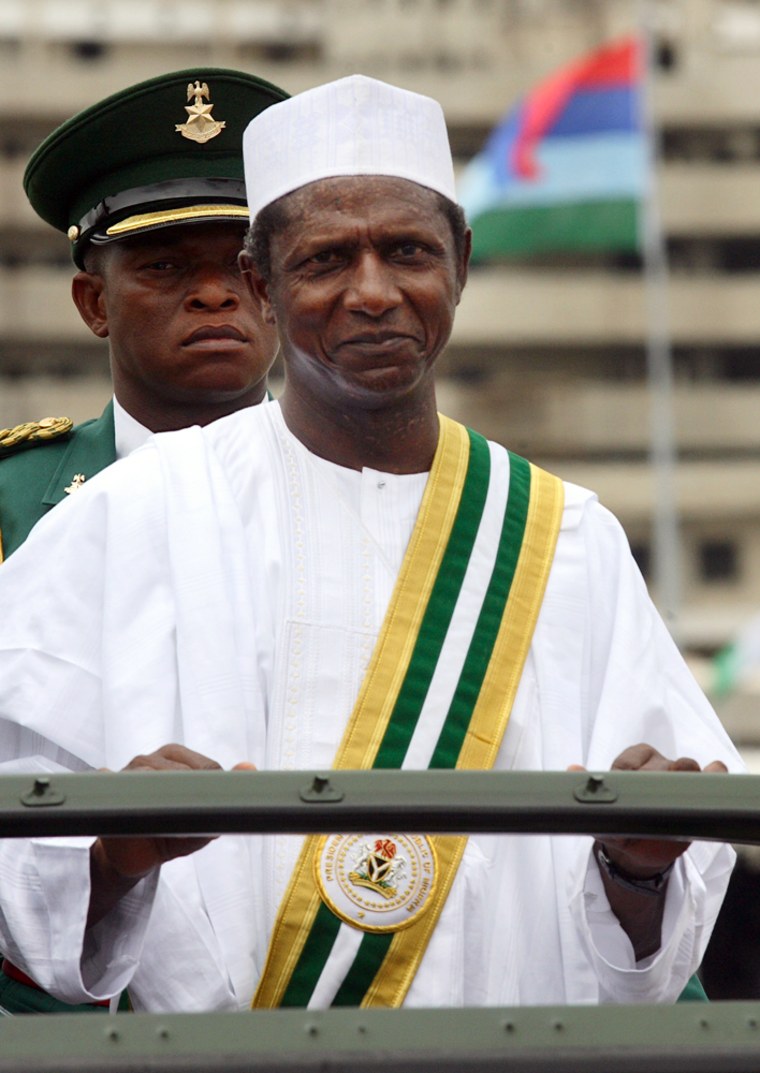This time, the shots were fired in celebration. For the first time in Nigeria's coup-riddled history of nearly six decades, power passed between two civilians and the army was hailing new President Umaru Yar'Adua with a 21-gun salute.
But while many Nigerians agreed the days of the military's political meddling officially ended with Yar'Adua's inauguration on a parade ground Tuesday, they also said it didn't mean Africa's most populous nation is pointing the way for other countries on the road to democracy.
"We have run the longest democratic dispensation and eliminated the risk of violent changes of government through coups and countercoups in our political culture," said outgoing President Olusegun Obasanjo.
Barred from running again by constitutional term limits, Obasanjo handed the reins of government over to his party's candidate, Yar'Adua, whose election he previously praised as having "deepened and strengthened democracy."
Yar'Adua, however, won an April vote that the opposition called the worst since independence from Britain in 1960 and international observers deemed not credible. Thugs stole ballot boxes and electoral officials thumbprinted stacks of voting cards as police looked on.
Still, many Nigerians say even flawed civilian rule is preferable to government by generals in their nation, which is Africa's biggest producer of oil and a major supplier of crude to the United States.
"There is hope for this country with the successful handover of power from one civilian government to another, but I wish this could have happened under a widely accepted electoral process devoid of all the inadequacies that characterized the elections," said Abuja resident Wale Fapohunda.
'It's not really a milestone'
Charles Dokubo, an analyst at the Nigerian Institute of International Affairs, said Yar'Adua faces a crisis of legitimacy as he takes on the country's problems, including violence in the oil heartland that has cut petroleum output by a third.
"Because of the shortcoming of the elections, it's not really a milestone," Dokubo said of the inauguration. "There's a cloud of suspicion now across the country. Most Nigerians are weary, they're tired of what (the politicians) are doing."
As home to Africa's biggest oil industry, Nigeria should be a leader on the world's poorest continent. But corruption, mismanagement and poor infrastructure have hobbled the economy and left the vast majority of its 140 million people living in poverty.
Obasanjo's 1999 election ended decades of near-constant military rule, including a particularly brutal 15-year phase that began in 1984.
Under civilian rule, Nigerians say they have gained freedoms and their country has shaken its reputation as an international pariah run by generals bent on looting the public coffers. Obasanjo also cleared the country's books of billions of dollars of debt racked up by military rulers and helped end at least two of West Africa's civil wars by sending troops to intervene.
But many Nigerians say graft continued to flourish under Obasanjo, pointing to the recent election as a case in point.
In his inaugural address, Yar'Adua acknowledged the polls were flawed and promised to put the system right.
Delta violence a priority
He also quickly addressed the country's most-grievous problem — a surge of militant attacks on the oil industry in the southern Niger Delta that has cut production and seen nearly 200 foreign workers kidnapped.
The 56-year-old Yar'Adua used his inaugural address to say that the delta's unrest needed "urgent attention" and promised to act quickly to address it.
"In the meantime, I urge all aggrieved communities, groups and individuals to immediately suspend all violent activities and respect the law," he said. "Let us allow the dialogue to take place in a conducive atmosphere."
The Movement for the Emancipation of the Niger Delta, which is the biggest militant group in the delta and previously insisted it would not lay down arms until the government met its demands to improve conditions in the region, said it would study the new president's appeal.
"We are considering this request," a spokesman said in an e-mail to The Associated Press.
Yar-Adua's unusually conciliatory overture to the militants caused world oil prices to fall, reflecting hopes that the new government in OPEC member Nigeria would contribute to stability in the market.
Militant groups in the delta say their violence is aimed at forcing the federal government to funnel more oil revenues to the Niger Delta. The government gets the vast majority of its revenue from oil, and many Nigerians complain that corrupt officials siphon off much of the money.
Yar'Adua promised to build roads and power plants, fight corruption, create jobs and keep inflation and interest rates low to attract foreign investment.
"Let us now join together to build a society worthy of our children," he said.
